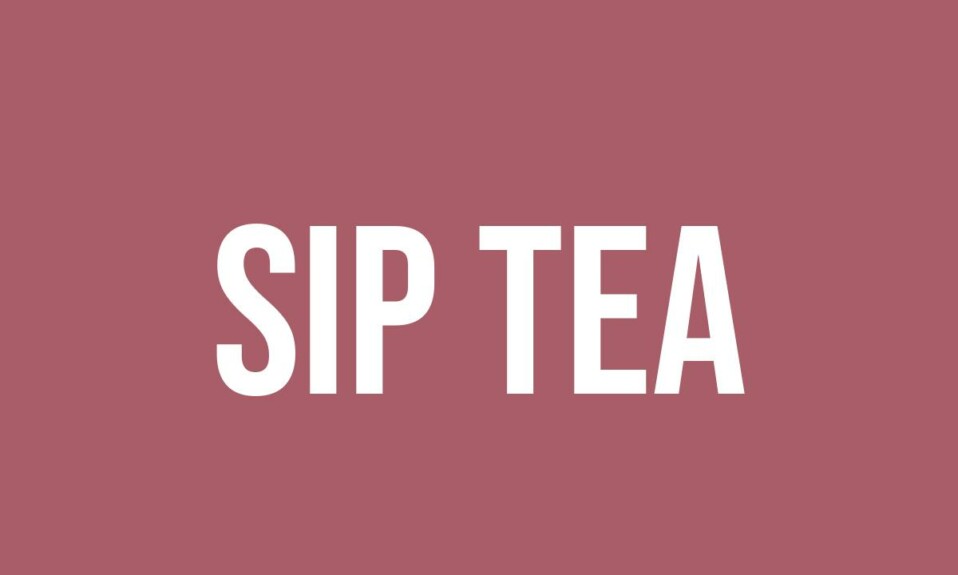What Does Sip Tea Mean?
The slang phrase sip tea means “mind your own business.” It is commonly used to describe someone who enjoys listening to gossip but prefers not to share it or get involved in the drama. The phrase originated as a replacement for “spill the tea,” which encourages people to share gossip. It comes from the expression “spill the T,” with the “T” standing for “truth.” Drag queen Lady Chablis introduced the phrase in the 1994 book “Midnight in the Garden of Good and Evil.”
Here are some examples of how to use the phrase sip tea in conversation:
- “I heard that Sarah and John broke up, but I’m just going to sip tea and let them figure it out.”
- “Did you hear about the drama at work? I’m just going to sip tea and stay out of it.”
- “My friend keeps telling me all this gossip, but I’d rather just sip tea and not get involved.”
- “There’s so much drama on social media, but I prefer to sip tea and not engage.”
- “I love hearing gossip, but I’m going to sip tea and not spread it around.”
It’s important to note that sip tea does not have a sexual connotation. It is simply used to encourage someone to mind their own business and avoid participating in gossip or drama.



What Does Sip Tea Mean From a Girl?
When a girl uses the phrase sip tea, it generally means the same thing as when anyone else uses it. It’s a way of telling someone to mind their own business and not get involved in gossip or drama. Girls use it in the same way as everyone else, and there is no specific meaning of sip tea that is exclusive to girls.
Girls may use sip tea in various contexts, such as:
- Observing drama: Girls might use sip tea to express their amusement or disinterest in the drama happening around them. It’s a way of saying “I’m just here to watch and not get involved.”
- Avoiding gossip: Girls may use sip tea to politely decline participating in gossip. It’s a lighthearted way of saying “I’d rather not be part of this conversation.”
- Expressing neutrality: Girls might use sip tea to remain neutral in a conflict or disagreement. It’s a way of saying “I’m not taking sides, I’m just observing.”
If a girl uses sip tea in a conversation with you, you can reply in various ways depending on the context:
- Join in the fun: If you’re comfortable with the topic and want to engage, you can respond with something like “Pass me the tea, I want to sip too!” or “I’m ready to sip some tea, spill it!”
- Respect their boundaries: If you’re not interested in gossip or drama, you can reply with something like “I’ll pass on the tea, but thanks for sharing!” or “I prefer to stay out of the drama, but I appreciate you telling me.”
- Change the subject: If you want to steer the conversation away from gossip or drama, you can reply with something like “Speaking of tea, have you tried that new bubble tea place?” or “Let’s talk about something more positive, like your recent trip.”
Remember, the key is to be respectful and considerate of the other person’s boundaries and comfort level.
Example 1:
- Girl A: Did you hear about what happened between Sarah and Lisa?
- Girl B: Oh, I’m just here to sip tea and watch the drama unfold.
Example 2:
- Guy: Hey, did you see that argument on social media?
- Girl: Yeah, I saw it, but I’d rather sip tea than get involved.
Example 3:
- Girl A: Did you hear the latest gossip about our classmates?
- Girl B: Thanks for sharing, but I’d rather not get caught up in the drama. I’ll just sip tea from the sidelines.
Example 4:
- Guy: What do you think about the feud between those two celebrities?
- Girl: I don’t really have an opinion. I’m just here to sip tea and enjoy the show.
Example 5:
- Guy: Did you see what happened at the party last night?
- Girl: Yeah, it was quite a scene. I’ll just sip tea and let them sort it out.
What Does Sip Tea Mean From a Guy?
When a guy uses the phrase sip tea, it can have similar meanings as when a girl uses it. However, there may be some slight differences in how guys use and interpret the phrase. Here are some possible explanations for what sip tea might mean from a guy:
- Observing without getting involved: Like girls, guys may use sip tea to express their amusement or disinterest in drama or gossip. It’s a way of saying “I’m just here to watch and not participate.”
- Avoiding unnecessary conflict: Guys may use sip tea to avoid getting caught up in unnecessary arguments or disagreements. It’s a lighthearted way of saying “I’d rather not get involved in this situation.”
- Maintaining neutrality: Guys might use sip tea to remain neutral in a conflict or to avoid taking sides. It’s a way of saying “I’m staying out of this and not picking a side.”
While the overall meaning of sip tea is the same for both guys and girls, guys may use it in slightly different contexts or situations. They may also have their own unique interpretations of the phrase.
If a guy uses sip tea in a conversation with you, you can reply in various ways depending on the context:
- Engage with humor: If you’re comfortable with the topic and want to join in the fun, you can respond with something like “Pass me the tea, I want to sip too!” or “I’m ready to sip some tea, spill it!”
- Respect their boundaries: If you’re not interested in drama or gossip, you can reply with something like “I’ll pass on the tea, but thanks for sharing!” or “I prefer to stay out of the drama, but I appreciate you telling me.”
- Change the subject: If you want to steer the conversation away from drama or conflict, you can reply with something like “Speaking of tea, have you tried that new bubble tea place?” or “Let’s talk about something more positive, like your recent trip.”
Remember, the key is to be respectful and considerate of the other person’s boundaries and comfort level, regardless of their gender.
Example 1:
- Guy 1: Dude, did you see that crazy basketball shot LeBron made last night?
- Guy 2: Yeah, he just casually sipped his tea and nailed it from half-court. Unbelievable!
Example 2:
- Guy 1: I’m about to ask Sarah out on a date. Wish me luck!
- Guy 2: You got this, man! Just sip your tea, stay confident, and she’ll say yes for sure.
Example 3:
- Guy 1: Check out this new guitar riff I came up with.
- Guy 2: Dude, that’s sick! You should totally sip your tea and record it. It’s gonna be a hit!
Example 4:
- Guy 1: I’m thinking of starting my own business. What do you think?
- Guy 2: Go for it, bro! Sip your tea, trust your instincts, and make it happen. I believe in you!
Example 5:
- Guy: I just finished writing my first novel.
- Girl: That’s amazing! How did you do it?
- Guy: Well, I just sipped my tea, let the creativity flow, and before I knew it, the words were on the page.
Origin of Sip Tea
The phrase “sip tea” originated as a replacement for “spill the tea,” which encourages people to share gossip. It was introduced by drag queen Lady Chablis in the 1994 book “Midnight in the Garden of Good and Evil.” The phrase is used to tell someone to mind their own business and not get involved in gossip or drama. It does not have a sexual connotation and is simply a way to encourage someone to stay out of other people’s business. The origins of the phrase are not derived from a popular typo or misspelling.
Frequently Asked Questions
Slangs similar to Sip Tea
The phrases “mind your own business,” “butt out,” “stick to one’s knitting,” “not concern yourself,” and “keep out of it” are all similar to “sip tea” because they all convey the idea of not interfering in the affairs of others and focusing on one’s own interests. These phrases are used to tell someone that something does not concern them or to discourage them from getting involved in gossip or drama.
Is Sip Tea A Bad Word?
No, “sip tea” is not a bad word or vulgar word. It is a phrase that means “mind your own business” and is often used to describe someone who enjoys listening to gossip but does not want to get involved or share it. It originated as an alternative to the phrase “spill the tea,” which encourages sharing gossip. While it can be used in a negative context, it is not inherently vulgar.
Is Sip Tea a Typo or Misspelling?
No, “sip tea” is not a misspelling or a typo. It is a slang phrase that means “mind your own business” and is commonly used to describe someone who enjoys listening to gossip but prefers not to share it or get involved in the drama.





